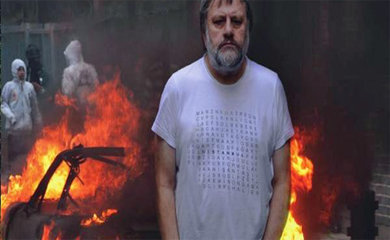Slavoj Zizek, The Year of Dreaming Dangerously, Verso, 2012.
The work of Slavoj Zizek is by now a genre of critical theory in itself, complete with its own distinctive characteristics. These include: discussions of Hegel, Marx and Lacan; analysis of recent political events interspersed with sections on recent popular culture; David Lynch and Hitchcock; counter-intuitive reversals of liberal, leftist and feminist prevailing wisdom; and large segments copy and pasted from previous books. All of these, with the exception of Lynch and Hitchcock, feature in the slightly uncharacteristic new book from Zizek.
The subject, as the title suggests, is the recent post-recession social movements across North America and Europe – Occupy Wall Street, the Arab Spring, and the right-wing fascist movements that have also emerged in Europe. Topic is always a little blurry with Zizek – one cannot always say a book is “about” any one thing in particularly – but The Year of Dreaming Dangerously sees Zizek strangely energised and focussed.
Some of the chapter on Occupy was initially delivered at Liberty Plaza/Zuccotti Park using the “human microphone,” repeated one phrase at a time. The systemic crisis in capitalism world-wide, from the North American stock market crisis to the Eurodebt debacle, gives new urgency to the Marxist Zizek’s political writing: this is a man whose time has come. “The true dreamers are those who think things can go on indefinitely the way they are,” he points out.
In an excellent chapter, Zizek argues that the television series The Wire shows the systemic failure of the Baltimore micro-economy – a failure at every level from police to courts to schools to politics. In The Wire’s Baltimore, politics proper cannot take place. Zizek quotes Wire creator David Simon, who says that “I accept that [capitalism] is the only viable way to generate wealth on a wide scale.” Zizek rejects this pessimistic diagnosis, in contrast arguing that the dreams of the Occupy movements et al chart a different way out of the current predicament.
Yet these are not altogether safe times. Zizek has longed noted the increasing authoritarian nature of liberal democracies – what he sees as the becoming-Chinese of capitalism in squishing dissent, “capitalism with Asian values.” In another chapter, he delves into the emergence of right-wing movements in Europe. The Norwegian mass killer Anders Behring Breivek proves a useful barometer for nationalist sentiment – a xenophobic murderer who aimed not at the racial Others he abhorred, but his liberal mutlticulturalist political opponents. Zizek points out that Breivek’s politics are embedded in state violence against Others, as well as the odd combination of Zionist anti-Semitism of the extreme right-wing that comes in the support of Israel’s apartheid policies against the feared Muslim Others (Breivek, of course, thought that there are too many Jews in the United States). The danger, Zizek points out, is that Europe could fall into fascism again – a not unwarranted warning given the situation in Greece with the neo-nazi party Golden Dawn, for example.
The Year of Dreaming Dangerously is not Zizek’s most theoretically audacious work – for that you must turn elsewhere, particularly to his work on MIT Press. However, it is the most focussed popular writing that Zizek has written for years. Highly recommended.

